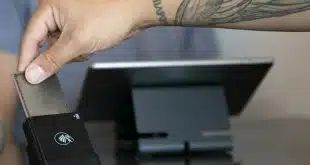By Terry Dooley
Deadline: A date or time when something must be finished: the last day, hour, or minute that something will be accepted.
The word “deadline” carries with it the implication of pressure—pressure to act or face the consequences. That’s the very word being tossed around when people talk with merchants about the Oct. 1 liability shift. Some people are even using it as a tactic to try to sell merchants on a problem that may not exist in their business.
Plain and simple, there’s no deadline to upgrade terminals to accept chip transactions. The fact is, the sun will come up on Oct. 1 and a merchant will find the world much as it did on Sept. 30.
The real risk for merchants isn’t inaction. Rather, it’s impulsive action. If small-to-medium-size merchants adopt the first phase of the EMV rollout, they risk increased costs down the road. Without seeing the full picture, a merchant may find it doesn’t have the choice or flexibility it wants or needs to control costs at the point of sale.
With this in mind, here’s a list of five questions merchants should ask before they make the investment in chip-enabled terminals:
1. Is the terminal I’m buying capable of supporting the common application identifier (AID) for PIN, PINless, and signature transactions? This is important because the license agreements negotiated by the national brands and debit networks allow for all transaction types—whether that be PIN, PINless, or signature—to be available through the common AID. By always selecting the common AID, merchants maximize choice and flexibility for all the different types of transactions they might chose to support.
2. Are the terminals and software I’m buying certified with all of the industry networks I plan to support? There are 22 debit networks in the U.S. alone. Ensuring merchants have a choice in partners means competition among networks and flexibility for their business.
3. Can my terminal vendor guarantee that even if the common AID isn’t the default for a transaction, I can still route the transaction to the network I choose? Because of international compatibility and acceptance, the global-brand AID (for example: MasterCard, Visa, etc.) will have priority on the card. Merchants need to ensure their terminals are configured to ignore AID prioritization and instead select the common AID. This will give merchants more control over costs.
4. How does the type of terminal I’m using change my routing choice? There are significant differences in a terminal’s capability. Merchants that have integrated POS systems in the store have more options to configure how EMV works. Additionally, support of the common AID may be easier on these types of terminals. Merchants that have standalone terminals, due to their business model or because of the cost of an integrated terminal, don’t have as many options. It’s even more important to make sure standalone terminals support the common AID. Otherwise, merchants will lose routing choice.
5. How will my new EMV solution guarantee me maximum routing choice? Early adopters of EMV technology may find their routing choice limited to the larger networks. It’s fair to ask how that might affect cost. Because there are so many debit networks, certification among all of the players could take some time.
Merchants have the right to use all of the tools available to them to control the cost of fast and more secure transactions. But unless merchants ask these questions before they buy an EMV-compatible terminal, they may find they’re faced with additional costs down the road to realize all of the benefits of EMV.
Remember, Oct. 1. is a liability shift, not a deadline. There are a lot of factors to consider in determining when merchants should make the switch to EMV, including their customers, type of business, average ticket, history of fraudulent transactions, and so on. Merchants will have to weigh the costs against the benefits.
—Terry Dooley is executive vice president and chief information officer at the Shazam Network, Johnston, Iowa.





